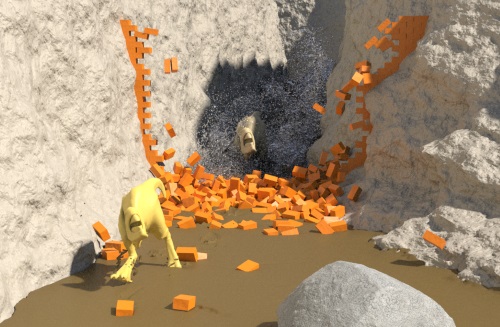Smoothed Particle Hydrodynamics for Physically-Based Simulation of Fluids and Solids

Graphics research on Smoothed Particle Hydrodynamics (SPH) has produced fantastic visual results that are unique across the board of research communities concerned with SPH simulations. Generally, the SPH formalism serves as a spatial discretization technique, commonly used for the numerical simulation of continuum mechanical problems such as the simulation of fluids, highly viscous materials, and deformable solids. Recent advances in the field have made it possible to efficiently simulate massive scenes with highly complex boundary geometries on a single PC. Moreover, novel techniques allow to robustly handle interactions among various materials. As of today, graphics-inspired pressure solvers, neighborhood search algorithms, boundary formulations, and other contributions often serve as core components in commercial software for animation purposes as well as in computer-aided engineering software.
This tutorial covers various aspects of SPH simulations. Governing equations for mechanical phenomena and their SPH discretizations are discussed. Concepts and implementations of core components such as neighborhood search algorithms, pressure solvers, and boundary handling techniques are presented. Implementation hints for the realization of SPH solvers for fluids, elastic solids, and rigid bodies are given. The tutorial combines the introduction of theoretical concepts with the presentation of actual implementations.
@inproceedings {KBST19,
title = "Smoothed Particle Hydrodynamics for Physically-Based Simulation of Fluids and Solids",
author = "Dan Koschier and Jan Bender and Barbara Solenthaler and Matthias Teschner",
year = "2019",
booktitle = "EUROGRAPHICS 2019 Tutorials",
publisher = "Eurographics Association"
}

